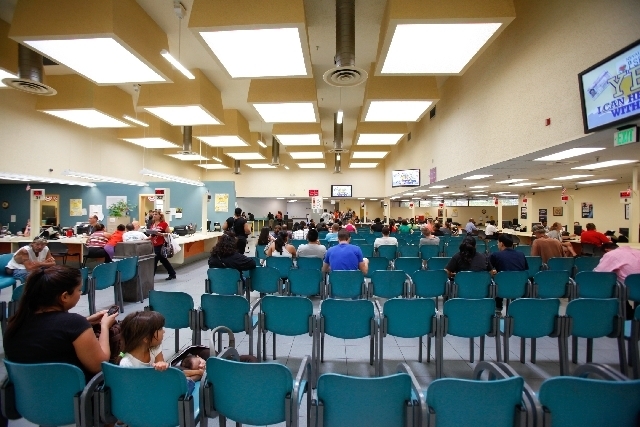Nevada DMV officials wonder how many will apply for new driver cards

CARSON CITY — As Nevada prepares to offer driver authorization cards to people living in the country illegally beginning Jan. 2, the big question for the Department of Motor Vehicles is how many people will show up to take advantage of the new program.
There are an estimated 60,000 people living in Nevada who are eligible for the card, which will allow them to drive legally in the state after demonstrating driver competency.
But whether they will turn out en masse in the first few days of the new year, potentially swamping DMV offices around the state with applications, remains unknown.
Jude Hurin, services manager for the Nevada DMV, said he has heard that “bus loads” of people might arrive at offices to apply for the cards that would allow them to drive legally in Nevada.
DMV spokesman Kevin Malone also said the most common concern expressed at community workshops the agency has conducted to explain the program is whether the information will somehow be turned over to officials with U.S. Immigration and Customs Enforcement.
Senate Bill 303 enacting the program specifically prohibits the use of the information by the federal government.
But lingering concerns about having personal information turned over to federal authorities could keep many eligible people on the sidelines, at least initially.
A DMV webpage answering frequently asked questions about the new program has been getting about 300 hits a day.
“There could be an overflow if everyone decides to come in at once,” Hurin said. “We hope that is not the case. If it is, we will take one customer at a time and do the best we can.”
State Senate Majority Leader Mo Denis, D-Las Vegas, the author of the measure, said he expects there will be a lot of interest in the cards.
“People are excited about the opportunity to have this,” he said.
Utah saw nearly 40,000 people obtain its version of the authorization card, although not everyone applied right away, Denis said. The program should be good for all Nevadans, he said. Roads will be safer, there will be fewer unlicensed and uninsured drivers on the roads, and the cost of uninsured motorist coverage should go down.
For those considering a trip to the DMV on Jan. 2, one handy way to determine whether it is a good time to visit is to go to the agency’s website, which posts wait times at its offices on the home page.
A majority of Nevada lawmakers and Gov. Brian Sandoval backed the authorization card for safety reasons, modeling it after the Utah program.
“This is not about politics,” Sandoval said when he signed the bill into law in May. “This is about making roads safer. This is good for everybody.”
Even so, there is a large segment of the public that is opposed to the cards. This opposition is one reason state Sen. Don Gustavson, R-Sparks, cited for voting against the bill. Nine Assembly Republicans voted no as well. All other lawmakers supported the measure.
Hurin said one plus with the new law is that funding was provided to hire 18 additional people to help process the requests. Fourteen of those positions will be in Las Vegas, with four others in Reno.
“They will help with any overflow,” he said.
The $22.25 fee charged to each card applicant is expected to cover the cost of the positions and generate surplus revenue to the state. Additional fees will be imposed if tests are required.
Denis said as much as $1 million could be brought in with the fees charged for the cards.
Hurin said a bottleneck could occur because of the number of people who will be required to take both the written and driving skills tests to get a card. Seven hundred field technicians are now receiving training on the program, Hurin said.
“We need to make sure our technicians are operating at the highest customer service level,” he said. “Some people are already skeptical. We want to make sure we do our best to make it a positive experience.”
The agency has been proactive in a number of ways, offering community workshops and posting information about the program on its website.
A new English language driver handbook is now online. A new Spanish language version is being translated at no cost by the Nevada Interpreters and Translators Association and will be available next week.
A list of approved translators who can translate documents needed to show identity or other requirements is also on the website. The DMV webpage with information on the cards also allows it to be translated into Spanish.
Driver authorization cards will be valid for one year only, and any changes will require a person to come into a DMV office to update the information. Those applying will have to show proof of identity, provide translations of any documents not in English and show proof of Nevada residency status by rent or lease receipts, public utility bill or other eligible document.
It will be up to other states, such as California which recently enacted a similar law, as to whether the cards will be accepted, the Nevada DMV said. The agency recommends checking with a state’s law enforcement before traveling.
It will be up to private businesses to accept the use of the card for identity for check cashing or other purposes, the agency said.
It cannot be used for any state benefits or for federal purposes such as boarding an aircraft.
Contact Capital Bureau reporter Sean Whaley at swhaley@reviewjournal.com 775-687-3900. Follow him on Twitter @seanw801.